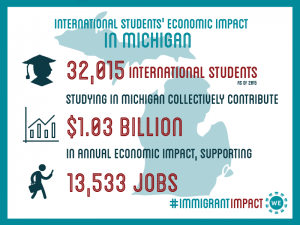While the immigration debate within the volatile 2016 presidential contest focuses on illegals who “make a run for it” at the border to gain downscale jobs, researchers in Michigan are discovering that foreign students graduating from state universities have infused $1 billion into the Michigan economy.
A report released this week by the nonprofit Global Detroit found that Michigan is achieving great success in keeping at home international students receiving master’s and doctoral degrees in high-tech fields. Overseas college students in Michigan grew nearly 32 percent over the past five years and now top 32,000.
Most of these graduates, now filling more than 13,000 jobs statewide, specialize in occupations in the field known as STEM – science, technology, engineering and math.
Steve Tobocman, director of Global Detroit and a former state representative, said that the “Filling The Talent Gap” report “only underscores the tremendously important role that international students play in strengthening and growing metro Detroit’s economy.”
Some of this success is due to Global Detroit’s training and placement program known as the Global Talent Retention Initiative (GTRI).
According to the report, Michigan employers who hire international students through the training program grew more than 80 percent over the past four years.

The unprecedented Global Detroit report found that there is a tremendous talent gap across the U.S. and in Michigan, especially in STEM jobs. The shortfall in STEM employment could reach 1.3 million jobs by 2020.
Global Detroit asserts that international students represent a critical opportunity to fill that gap. Across Michigan, more than 60 percent of the STEM PhD graduates in recent years are international students, including 61 percent of engineering PhDs awarded between 2006-2010.
“Data like this is more than impressive,” said Sandy Baruah, president and CEO of the Detroit Regional Chamber of commerce. “We know that utilizing international students rather than allowing positions to go unfilled helps companies compete and grow. And while our region is leading the nation in helping employers to consider international talent for hard-to-fill positions, more needs to be done.”










